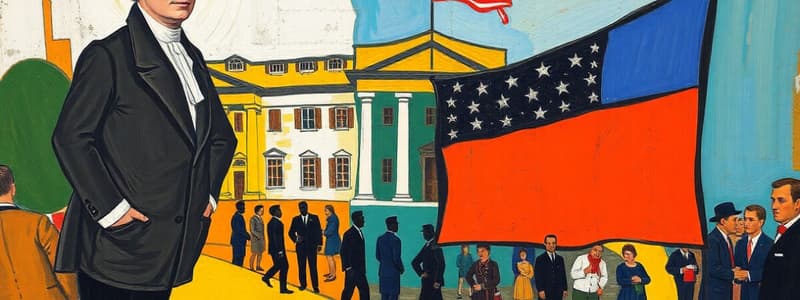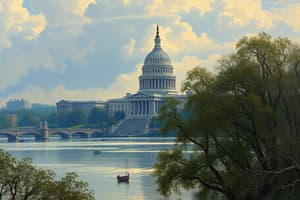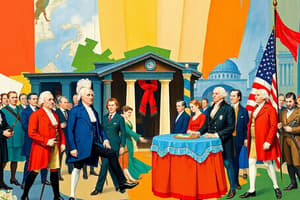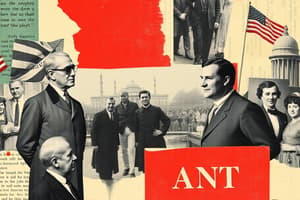Podcast
Questions and Answers
What precedent did George Washington establish regarding presidential terms?
What precedent did George Washington establish regarding presidential terms?
- Serving only one term
- Serving an indefinite number of terms
- Serving only two terms (correct)
- Serving a maximum of four terms
Which individual served as Secretary of State under George Washington?
Which individual served as Secretary of State under George Washington?
- Henry Knox
- Alexander Hamilton
- John Adams
- Thomas Jefferson (correct)
What economic strategy did Alexander Hamilton advocate?
What economic strategy did Alexander Hamilton advocate?
- Promoting an agrarian economy to benefit farmers
- Creating a strong national government with pro-business policies (correct)
- Establishing a free market with no government intervention
- Dissolving the national bank to eliminate debt
What was the main cause of the Whiskey Rebellion in 1794?
What was the main cause of the Whiskey Rebellion in 1794?
How did the Federalists view the French Revolution?
How did the Federalists view the French Revolution?
What was one of the main goals of Hamilton's Economic Plan?
What was one of the main goals of Hamilton's Economic Plan?
Which of the following describes the Democratic-Republicans' beliefs?
Which of the following describes the Democratic-Republicans' beliefs?
What compromise was reached regarding the location of the national capital?
What compromise was reached regarding the location of the national capital?
What characterizes the Hudson River School of art?
What characterizes the Hudson River School of art?
Which author is known for blending American folklore into their works?
Which author is known for blending American folklore into their works?
What aspect did Transcendentalism emphasize?
What aspect did Transcendentalism emphasize?
What was a key outcome of the Second Great Awakening?
What was a key outcome of the Second Great Awakening?
Which literary work is associated with Herman Melville?
Which literary work is associated with Herman Melville?
Which of the following movements advocated for modernization in the Ottoman Empire?
Which of the following movements advocated for modernization in the Ottoman Empire?
How did the Meiji Reformation impact Japan?
How did the Meiji Reformation impact Japan?
What did the literature of the 19th century American writers primarily focus on?
What did the literature of the 19th century American writers primarily focus on?
What were the main causes of the Civil War?
What were the main causes of the Civil War?
Which of the following candidates won the Election of 1860?
Which of the following candidates won the Election of 1860?
What was one of the Confederate advantages during the Civil War?
What was one of the Confederate advantages during the Civil War?
Which event marked the beginning of the Civil War?
Which event marked the beginning of the Civil War?
Which strategy did the Union adopt to undermine Southern resources?
Which strategy did the Union adopt to undermine Southern resources?
What was one of the primary reasons behind the British impressment of U.S. sailors?
What was one of the primary reasons behind the British impressment of U.S. sailors?
Who were the 'War Hawks' in Congress during Madison's presidency?
Who were the 'War Hawks' in Congress during Madison's presidency?
What significant event occurred in Washington, D.C. in 1814 during the War of 1812?
What significant event occurred in Washington, D.C. in 1814 during the War of 1812?
What was the outcome of the Battle of Baltimore in 1814?
What was the outcome of the Battle of Baltimore in 1814?
What was the Hartford Convention of 1814-1815 primarily about?
What was the Hartford Convention of 1814-1815 primarily about?
What were the Orders in Council issued by Britain during the Napoleonic Wars?
What were the Orders in Council issued by Britain during the Napoleonic Wars?
What did Federalists fear about Madison's request to declare war on Britain?
What did Federalists fear about Madison's request to declare war on Britain?
How did the British supply Native American tribes during the War of 1812?
How did the British supply Native American tribes during the War of 1812?
What major purchase doubled the size of the United States under Thomas Jefferson's presidency?
What major purchase doubled the size of the United States under Thomas Jefferson's presidency?
Which president's actions led to the establishment of the Indian Removal Act?
Which president's actions led to the establishment of the Indian Removal Act?
What was a key reason Martin Van Buren opposed the annexation of Texas?
What was a key reason Martin Van Buren opposed the annexation of Texas?
Which president is known for his slogan '54°40’ or Fight!'?
Which president is known for his slogan '54°40’ or Fight!'?
The Treaty of Guadalupe Hidalgo ended which war?
The Treaty of Guadalupe Hidalgo ended which war?
Who succeeded William Henry Harrison and was instrumental in the Texas Annexation?
Who succeeded William Henry Harrison and was instrumental in the Texas Annexation?
What was the main motivation behind the belief in Manifest Destiny?
What was the main motivation behind the belief in Manifest Destiny?
Which U.S. President's policies were primarily linked to conflicts with Mexico?
Which U.S. President's policies were primarily linked to conflicts with Mexico?
What was the primary consequence of the Union victory at the Battle of Antietam?
What was the primary consequence of the Union victory at the Battle of Antietam?
Which of the following best describes Lincoln's 10% Plan for Reconstruction?
Which of the following best describes Lincoln's 10% Plan for Reconstruction?
What event marked the end of the Civil War?
What event marked the end of the Civil War?
What was one of the main functions of the Freedmen's Bureau?
What was one of the main functions of the Freedmen's Bureau?
Which amendment guarantees voting rights regardless of race?
Which amendment guarantees voting rights regardless of race?
What was a primary goal of Radical Reconstruction?
What was a primary goal of Radical Reconstruction?
What response did Southern states have to the freedoms granted to former slaves during Reconstruction?
What response did Southern states have to the freedoms granted to former slaves during Reconstruction?
Which statement accurately reflects President Andrew Johnson's approach to Reconstruction?
Which statement accurately reflects President Andrew Johnson's approach to Reconstruction?
Flashcards
George Washington
George Washington
The first President of the United States who established key precedents for future presidents, such as forming a cabinet and serving only two terms.
Washington's Cabinet
Washington's Cabinet
A group of advisors chosen by the president to help him make decisions, the first cabinet consisted of the Vice President, Secretary of Treasury, Secretary of State, Secretary of War, and Attorney General.
Federalists
Federalists
A political party led by Alexander Hamilton, that advocated for a strong national government, a pro-business economy, and believed power should rest with the wealthy and educated elite.
Democratic-Republicans
Democratic-Republicans
Signup and view all the flashcards
Debt Crisis
Debt Crisis
Signup and view all the flashcards
Hamilton's Economic Plan
Hamilton's Economic Plan
Signup and view all the flashcards
Whiskey Rebellion
Whiskey Rebellion
Signup and view all the flashcards
French Revolution
French Revolution
Signup and view all the flashcards
British Impressment
British Impressment
Signup and view all the flashcards
Orders in Council
Orders in Council
Signup and view all the flashcards
Berlin Decree
Berlin Decree
Signup and view all the flashcards
War Hawks
War Hawks
Signup and view all the flashcards
Battle of Baltimore
Battle of Baltimore
Signup and view all the flashcards
Hartford Convention
Hartford Convention
Signup and view all the flashcards
Madison's Presidency
Madison's Presidency
Signup and view all the flashcards
James Madison
James Madison
Signup and view all the flashcards
Hudson River School
Hudson River School
Signup and view all the flashcards
Rise of American Culture
Rise of American Culture
Signup and view all the flashcards
American Literature
American Literature
Signup and view all the flashcards
Transcendentalism
Transcendentalism
Signup and view all the flashcards
The Second Great Awakening
The Second Great Awakening
Signup and view all the flashcards
Young Turks
Young Turks
Signup and view all the flashcards
Meiji Reformation
Meiji Reformation
Signup and view all the flashcards
Protestant Reformation
Protestant Reformation
Signup and view all the flashcards
Manifest Destiny
Manifest Destiny
Signup and view all the flashcards
Louisiana Purchase
Louisiana Purchase
Signup and view all the flashcards
Indian Removal Act
Indian Removal Act
Signup and view all the flashcards
Trail of Tears
Trail of Tears
Signup and view all the flashcards
Texas Annexation
Texas Annexation
Signup and view all the flashcards
Oregon Boundary Dispute
Oregon Boundary Dispute
Signup and view all the flashcards
Mexican-American War
Mexican-American War
Signup and view all the flashcards
Treaty of Guadalupe Hidalgo
Treaty of Guadalupe Hidalgo
Signup and view all the flashcards
Fugitive Slave Act
Fugitive Slave Act
Signup and view all the flashcards
Kansas-Nebraska Act
Kansas-Nebraska Act
Signup and view all the flashcards
Dred Scott Decision
Dred Scott Decision
Signup and view all the flashcards
Abraham Lincoln's Goal (Union vs Slavery)
Abraham Lincoln's Goal (Union vs Slavery)
Signup and view all the flashcards
Fort Sumter
Fort Sumter
Signup and view all the flashcards
What were the Border States?
What were the Border States?
Signup and view all the flashcards
What measures did Lincoln take to maintain Union control?
What measures did Lincoln take to maintain Union control?
Signup and view all the flashcards
What was the significance of the Battle of Antietam?
What was the significance of the Battle of Antietam?
Signup and view all the flashcards
What was the significance of the Battle of Gettysburg?
What was the significance of the Battle of Gettysburg?
Signup and view all the flashcards
What was the significance of the Vicksburg Campaign?
What was the significance of the Vicksburg Campaign?
Signup and view all the flashcards
What was Sherman's March and why was it important?
What was Sherman's March and why was it important?
Signup and view all the flashcards
What was the 13th Amendment and what did it accomplish?
What was the 13th Amendment and what did it accomplish?
Signup and view all the flashcards
What were the major differences between President Johnson's and Congress's Reconstruction plans?
What were the major differences between President Johnson's and Congress's Reconstruction plans?
Signup and view all the flashcards
Study Notes
George Washington and John Adams Presidencies
- George Washington served as the first President of the United States from 1789 to 1797.
- He established important precedents, including forming a cabinet and serving only two terms.
- President Washington's Cabinet included Alexander Hamilton (Treasury), Thomas Jefferson (State), Henry Knox (War), and Edmund Randolph (Attorney General).
- John Adams was the second President from 1797 to 1801.
- The emergence of political parties, Federalists (Hamilton) and Democratic Republicans (Jefferson), occurred during these presidencies leading to differing opinions.
Problems Facing Washington Administration
- The United States owed significant debt to European banks and American merchants.
- Alexander Hamilton's Economic Plan aimed to unify national finances (assume state debts), stabilize the economy (national bank), and introduce new taxes (tariffs and excise taxes).
- The Whiskey Rebellion (1794): Farmers protested the tax on whiskey, and President Washington sent troops, showcasing federal power.
Problems Facing the Adams Administration
- France viewed the Jay Treaty (1794) as pro-British and retaliated by seizing U.S. ships.
- The XYZ Affair (1797): French agents demanded bribes to meet with the French foreign minister. This caused negative feelings towards France.
John Adams Presidency
- John Adams won the Election of 1796.
- During the Adams presidency, the Quasi-War with France (1798–1800) happened.
- Alien and Sedition Acts (1798): These acts were aimed at silencing criticism of the federal government, and were viewed as violating the 1st Amendment.
- The Virginia and Kentucky Resolutions (1798–1799) argued for states' rights to nullify federal laws.
Supreme Court Under John Marshall
- John Marshall played a vital role in expanding federal power and the judiciary's authority.
- Marbury v. Madison (1803): Established judicial review, the power of the Supreme Court to declare laws unconstitutional.
Thomas Jefferson's Presidency
- Thomas Jefferson won the election of 1800.
- His presidency saw multiple important events including the Louisiana Purchase, which doubled the size of the country and the Lewis and Clark Expedition.
- Thomas Jefferson's presidency was known as the "Revolution of 1800" for the peaceful transfer of power from one political party to another.
James Madison's Presidency
- The presidency of James Madison was dominated by foreign policy concerns, and led to the War of 1812.
- Key factors leading up to the War of 1812 included, British impressment of American sailors, arming of Native Americans and the Orders in Council, a British policy that restricted trade.
- The War of 1812 ended with the Treaty of Ghent in 1814, with a return to pre-war conditions.
James Monroe's Presidency
- Monroe's presidency is known as the "Era of Good Feelings". This period was marked with optimism and unity after the War of 1812.
- The Missouri Compromise (1820-1821) addressed the growing sectionalism and the balance of free/slave states.
- Monroe Doctrine (1823): Prevented European colonization or intervention in the Americas.
Andrew Jackson's Presidency
- Andrew Jackson won the Election of 1828 in a landslide.
- His presidency saw significant growth of the United States.
- Jackson's policies and actions raised significant debate (e.g., the spoils system, the national bank, the nullification crisis, and Indian Removal Act/Trail of Tears).
- The Panic of 1837 was an important event during his presidency.
Reform Movements
- Abolitionist Movement: Focused on ending slavery.
- Women's Rights Movement: Demanded equality in education, voting, and property rights (ex. Seneca Falls Convention).
- Temperance Movement: Promoted reduction of alcohol consumption.
- Education Reform: Advocated for free and universal public education (Horace Mann).
- Mental Health Reform: Advocated for more humane treatment of the mentally ill (Dorothea Dix).
Manifest Destiny
- Belief that the U.S. was destined to expand westward.
- Key events like the Mexican-American War (1846–48) and the acquisition of the Oregon Territory supported this expansionist view.
- This belief was fueled by economic opportunities and a belief in American exceptionalism.
The Civil War
- The Civil War (1861-1865) stemmed from profound disagreements about slavery, states' rights and economic differences.
- Key events, such as the Emancipation Proclamation, Lincoln's Gettysburg Address, and the surrender at Appomattox Court House, shaped the course of the war. Key figures like Lincoln, Lee and Grant influenced this period.
Reconstruction
- Reconstruction (1865–1877): The period after the Civil War.
- Key themes include the 13th, 14th, and 15th Amendments (abolishing slavery, granting equal protection, and ensuring male voting rights).
- The period is characterized by great debate on federal vs. state power, slavery's impact and the political and social changes of the era.
Studying That Suits You
Use AI to generate personalized quizzes and flashcards to suit your learning preferences.




